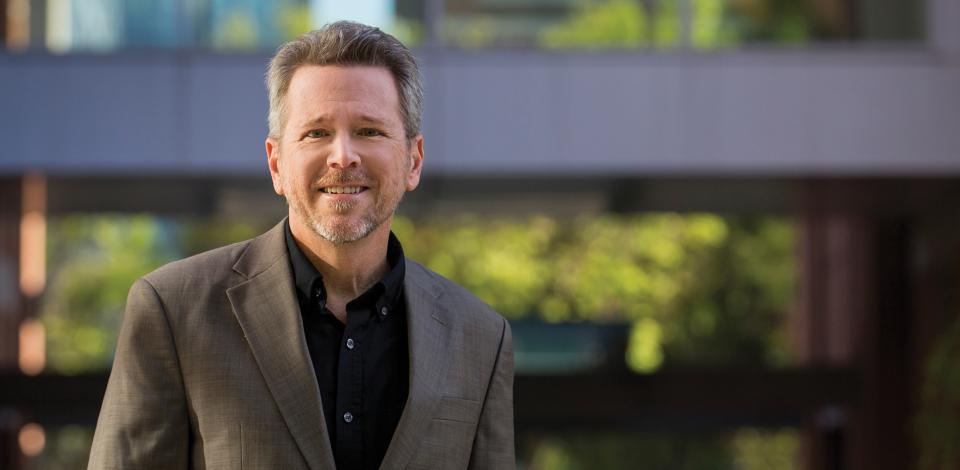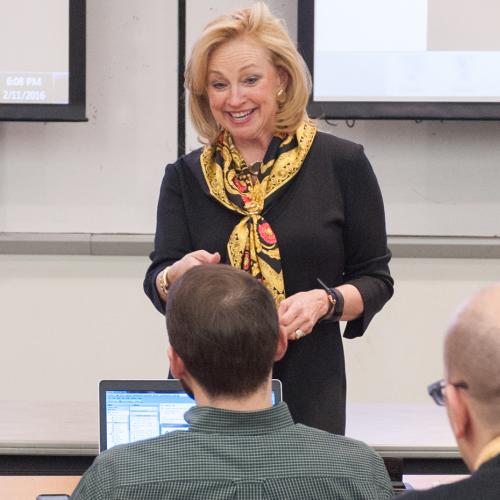Research and Instruction: A Winning Combination
Defense technology instructor reveals why he loves teaching adult learners

Principal Research Engineer Glenn Hopkins is Georgia-raised, Georgia Tech-educated and made his professional name at the Georgia Tech Research Institute (GTRI). He says it was never his master plan, but Tech became his “lifetime job.”
“Georgia Tech was my first choice for undergrad schooling, so I went there,” Hopkins said. “I needed to work my way through school. My family provided some money up front, but then it was up to me to figure out how to work my way through the rest.”
Hopkins’ search for employment led him to GTRI, a decision that opened an entirely new world of opportunity for him. He started as a student in the research institute in 1983 and went full time in 1987. He’s never looked back.
GTRI develops advanced tech solutions and large-scale system prototypes to solve various real-world problems – predominantly for national security interests. Hopkins said that the work itself was always enough to keep him on board.
“I had family members that served in the military and I seriously contemplated going that route,” Hopkins said. “So the GTRI route that I wound up choosing sort of checked a couple of boxes. I really like supporting the defense of the nation and I really like tough technical problems -- puzzles to solve, if you will. GTRI gave me the opportunity to achieve a number of personal career objectives all at the same time.”
The work, Hopkins stressed, is tremendously varied, forcing him to learn new approaches and technologies all the time in order to stay on the leading edge of technology. Throughout his research career, much of his work has focused on phased array antennas in GTRI’s Antenna Systems Division (ASD) of the Sensors and Electromagnetic Applications Laboratory (SEAL). He’s designed, developed, and tested a host of components and subsystems, publishing more than 90 papers and racking up three printed circuit antenna patents.
The phased array allows for tremendous speed and greater signal throughput. The ramifications go far beyond the defense world, however, impacting the near future of 5G cellular network technology.
“I don't know if it's two years or four years or five years away, but the 5G technology area is exploding into everyday life,” Hopkins said. “It’s really fun to watch and learn how other people are approaching the same problem sets, but from the perspective of low cost and different technical requirements. The technology base that they're pulling from is all the same. When I went through bachelor's and undergrad, the things that I focused on were sort of esoteric and they weren’t in people's everyday lives, but you'll be carrying array antennas around in a couple of years and that's really awesome.”
In addition to his full-time research job, Hopkins is also an administrator and part-time instructor in GTPE’s defense technology portfolio. His accomplishments here earned him 2018 honors as the IEEE Atlanta Section Outstanding Educator of the Year.
Hopkins said that he loves connecting with adult learners, in part because of the new perspectives they bring to the material.
“They bring up questions and perspectives about things I may or may not have thought about, and often from new angles,” Hopkins said. “They keep me researching and up to date in areas that I might not be actively working in right at that time. It is very symbiotic in that I learn from what they’re doing and I try to inform what they’re doing. There’s the old adage that the only way to truly learn something is to have to teach it, and that absolutely holds.”
In his teaching, Hopkins values both the ability to help the learners achieve their professional goals while also benefiting his work at GTRI professionally. “It helps me personally make contacts with organizations that I might not be working with and with individuals that I might not know across the country and profession,” Hopkins said. “It's a great relationship coupling the two careers that are going on in parallel.”
Hopkins also stresses that GTPE’s professional education benefits U.S. Department of Defense (DOD) programs that suffer from significant age and hiring gaps.
“The DOD went through a hiring slump at the time of the fall of the former Soviet Union,” Hopkins said. “So there's sort of an age gap. There is a significant number of senior people and then a gap in the middle level and then a lot of junior people. So with the professional education courses, we are trying to help fill that experience gap and bring along all of the new hires.”
But there’s another gap Hopkins concerns himself with as a teacher – the need for connections between the theory taught in undergraduate education and the demands of real-world applications. Toward this end, he often brings in physical hardware and prototypes to help realize the course material.
“What I learned through work and learning and as an adult is not just the theory of the hammer (as an example) but the proper uses of the hammer,” Hopkins said. “Where is it appropriate? How do you employ it? They don't necessarily teach that in undergrad or even graduate school. In those settings, you get to focus on the theory behind the hammer, but they don't tie things together and that can be a significant void for students. The combination of GTRI’s experiences with GTPE instruction hopefully puts the pieces of the puzzle together.”
Written by Robert Lamb

